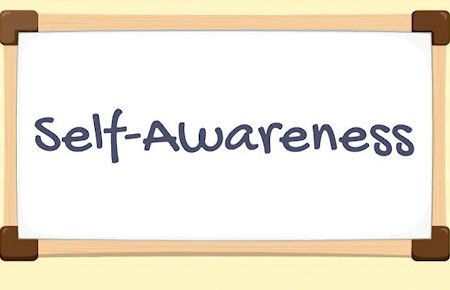
Self awareness is the ability to evaluate yourself socially and understand how your behavior is being perceived by others. If you’re self-aware, you know how you’re feeling, how you’re acting, and how you appear. You likely have a strong grasp on your own strengths and weaknesses, which means that you know where and how you’ll be most useful. This knowledge can make you a great leader because you have an understanding of what skills you may be missing and therefore where and how you need others to apply their skills.
Self-awareness can also help you train yourself to think about your emotions in a productive way. It requires self-reflection and interpretation, so if you’re self-aware, when you get upset you might start to think about why you feel as you do and find that the feeling is momentary, misplaced, or a catalyst for positive action. Doing this allows you to think of your emotions as part of a larger picture, so you don’t become consumed by them. Knowing the reasoning behind your emotions can also give you a greater sense of control over them, improving self-efficacy.
Prompts That Support Self-Awareness
Self-Awareness is considered to be having clear perception of personality, including strengths, weaknesses, thoughts, beliefs, motivation, and emotions.
- Self-Reflection: Assessing one’s ability to introspect and examine their thoughts, emotions, and behaviors in a reflective manner, gaining insights into personal strengths, weaknesses, and values.
- Self-Acceptance: Evaluating one’s level of self-acceptance and embracing oneself with compassion and non-judgment, including accepting both positive and negative aspects of one’s identity.
- Self-Awareness of Strengths and Weaknesses: Assessing the knowledge and understanding of personal strengths and weaknesses, and how they contribute to overall well-being and performance.
- Self-Compassion: Measuring the ability to treat oneself with kindness, understanding, and forgiveness, especially during challenging times or when facing setbacks.
- Emotional Regulation: Evaluating one’s capability to recognize, understand, and manage their emotions effectively, promoting emotional well-being and fostering healthy relationships.
- Self-Motivation: Assessing the ability to set and pursue personal goals, maintain motivation, and take proactive steps towards personal growth and development.
- Authenticity: Evaluating one’s ability to be true to oneself, aligning actions, beliefs, and values, and presenting oneself genuinely to others.
- Self-Advocacy: Measuring the capacity to assert one’s needs, desires, and boundaries in a respectful and assertive manner, effectively communicating and advocating for oneself.
- Empathy towards Self: Assessing the ability to show understanding, compassion, and empathy towards oneself, treating oneself with the same care and consideration as one would treat others.
- Personal Vision and Goals: Evaluating one’s clarity and articulation of personal vision, long-term goals, and aspirations, and the alignment of actions with that vision.
- What are some things that make you feel mad?
- What are some things that make you feel sad?
- What are some things that make you feel happy?
- What strategies have you used to help with difficult emotions during online learning or your transition back to school?
- What do you like about ____?
- What is challenging about ____?
- What is something you are good at?
- Who in the school, your family or your neighborhood can you go to if you are having a problem in/at ____– like with a friend?
- What assets do you see in yourself?
- What are some goals you have in/at ____?
- What internal qualities or external supports have helped you accept new challenges and adjust to change?
- How did you handle it if you ever felt like giving up at something you wanted to get better at?

